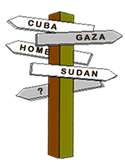PROGRAMS BY SUBJECT/REGION
How do you teach children to be global citizens - to care about strangers living in situations that they can barely imagine, let alone understand? How do we convince our students to recycle, to vote, to read the newspaper and to give back to their own community and to the world?
Take 2 sends a film crew out for three months each year to capture in-depth stories of global regions or issues. We then make the footage available to teachers (with comprehensive curriculum) so that their students can create their own documentaries and develop a personal stake in our interconnected world.
California Water Wars, Recycling, Overfishing, the pros and cons of Wind Energy and Solar Energy, the Water Cycle, and the case for Global Warming. Seven topics in four broad environmental categories: Oceans, Water, Energy, and Climate - and how we can make a difference.
EXAMPLE: Tsukiji fish market is the largest seafood wholesalers in the world - and the home of Japan's famous tuna auction. A single tuna can sell for as much as $60,000 in the bidding frenzy for this increasingly scarce delicacy. Footage: Join Japan's fishing fleet as they scour the dark waters of the Pacific Ocean, then follow the tuna to the market, through the auction, and finally gets prepared for customers at a Tokyo sushi bar in Overfishing: Japan's Tuna Frenzy.
A young girl's life in a Sudanese refugee camp, rebels and soldiers fighting an endless war, humanitarian base camps and the workers who try to make a difference, the battle between traditional medicine and modern health care in North Africa, a family's journey back to rebuild their village, and a young man's struggle to make a better life for himself and his family. Remote villages, interviews with butchers, Doctors Without Borders, the king of Eastern Chad, military commanders, bakers, Koranic leaders, teachers, students, and the elderly. Genocide, religion (Islam), languages, economics, politics, and culture. What do young people in North Africa dream of? What do their parents fear? A comprehensive look at the issues facing refugees, young people, health care, the military, humanitarian organizations, and life in the camps in the wake of the genocide in Darfur.
EXAMPLE: In Farchana refugee camp, the local Sudanese butcher is also the camp surgeon. Gamar has four wives and sixteen children. He spends his days cutting up goats at the meat market and his nights fixing broken bones, stitching wounds, and treating infections. He learned his surgery from examining the insides of goats and cows. Footage: Gamar setting a compound fracture on a four-year-old boy; Gamar butchering animals (PG14) and selling meat in the market; Gamar at home and with friends; and an interview with Gamar in The Health Care Debate.
Life in Havana, remote Cuban villages, farming communities, fishermen and tobacco farmers, Santeria priestesses, itinerant traders, doctors, mechanics, and other locals throughout Cuba. A comprehensive look at the issues facing Cubans today - from the black market to health care, politics, festivals, music, tourism, entertainment, work, transportation, religion, and life in general. Our tiny neighbor to the south is on the brink of explosive changes. This behind-the-scenes look at a side of Cuba that most tourists never see will give your students a ringside seat into history as it happens.
EXAMPLE: Every December, the sleepy village of Remedios comes to life - with a bang. Tens of thousands of homemade fireworks are shot from windows, pipes, racks, rooftops, and churches. Burning papers - and gunpowder -rain down on the spectators. Rides, floats, lights, games, food, and dancing (this is Cuba, after all) fill the square. But there's a great deal more to this festival than just fun and games. Footage: Preparing the floats, fireworks, costumes, etc. The fireworks (close up). Spectators, games, pickpockets, rides, food, and a most unexpected conclusion in Light My Fire, Baby!
LOGISTICS
Want to know more about our field work? How we choose our locations and the issues we cover? What kind of equipment our field crews take with them? Preparations and logistics for a shoot in a war zone?
Want to read some stories from the road?
Find out howa Granny can save you on a dark Havana street at night.
How to make a grown man cry in a refugee camp.
The unexpected uses for a red-eared donkey in Chad.


